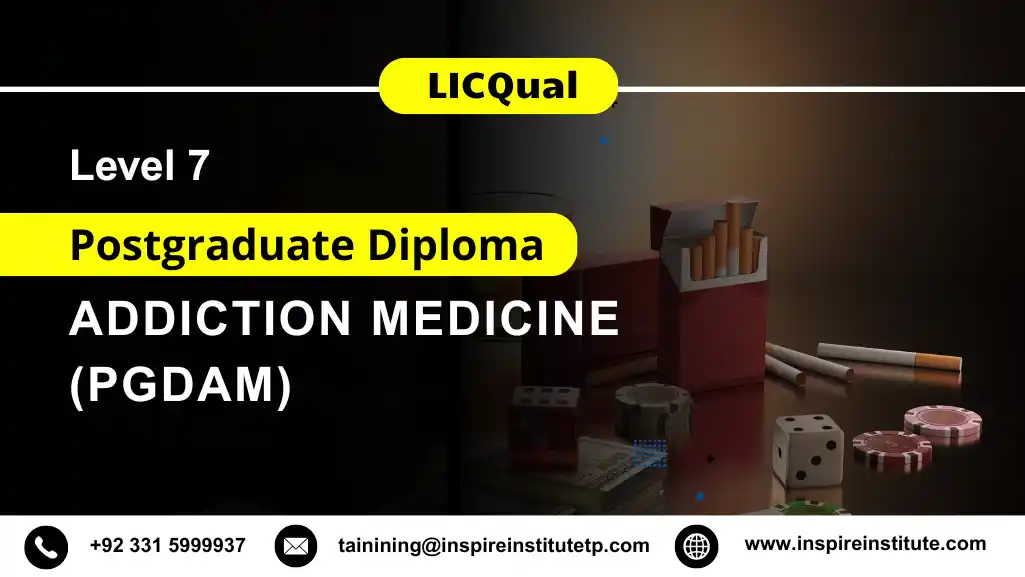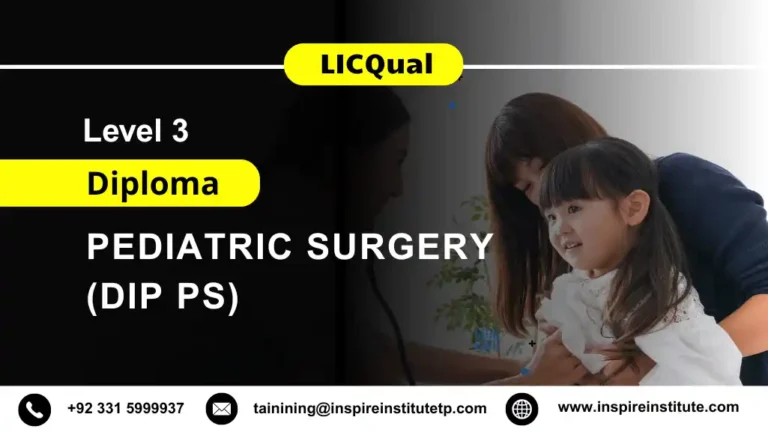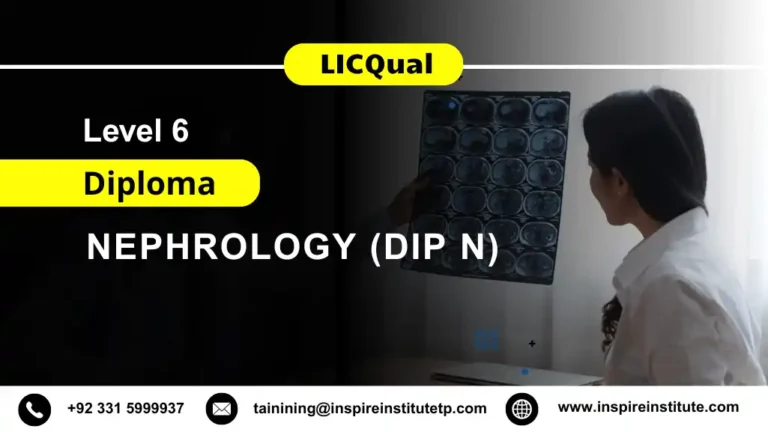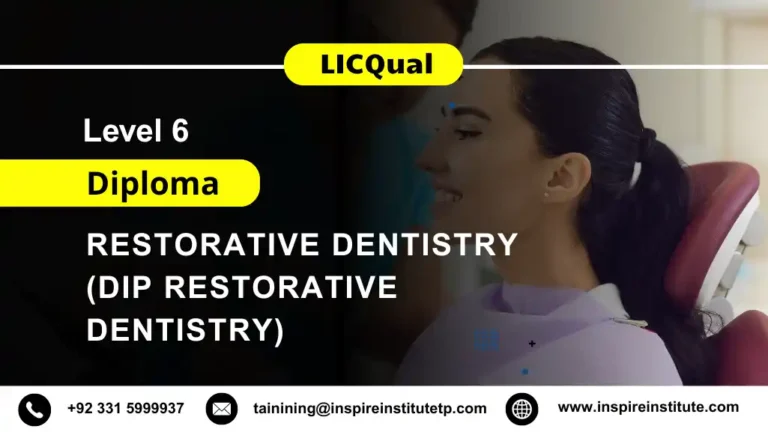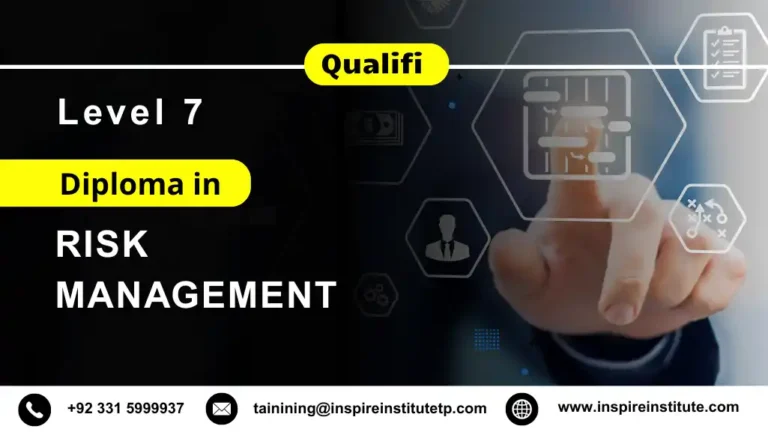LICQual Level 7 Postgraduate Diploma in Addiction Medicine (PgDAM)
The LICQual Level 7 Postgraduate Diploma in Addiction Medicine (PgDAM) is a UK-accredited qualification designed for healthcare professionals, psychiatrists, medical practitioners, and clinical specialists seeking to advance their expertise in addiction treatment, substance use disorders, and patient rehabilitation. This assignment-based postgraduate diploma combines theoretical knowledge with practical applications, enabling learners to assess, diagnose, and manage complex cases of addiction effectively. Through evidence-based learning, the course equips professionals to enhance patient outcomes, implement innovative treatment plans, and contribute to addiction medicine research globally.
The programme provides comprehensive insights into the biological, psychological, and social aspects of addiction. Learners study substance misuse patterns, neurobiology of addiction, pharmacological interventions, and behavioral therapies. The course also covers emerging challenges such as dual diagnosis, co-occurring mental health conditions, and societal impacts of addiction, preparing professionals to address complex clinical scenarios confidently.
The course emphasizes flexible learning pathways for busy professionals, allowing learners to balance clinical responsibilities with postgraduate study. Access to structured academic support, expert mentorship, and comprehensive digital resources ensures a seamless learning experience tailored to the needs of healthcare practitioners.
The LICQual Level 7 Postgraduate Diploma in Addiction Medicine (PgDAM) empowers healthcare professionals to become leaders in addiction treatment, combining advanced knowledge, practical skills, and internationally recognized credentials. Graduates are prepared to advance clinical practice, support patient recovery, and influence policy and research in the field of addiction medicine globally.
Why Choose this Qualification
The LICQual Level 7 Postgraduate Diploma in Addiction Medicine (PgDAM) is designed to equip healthcare professionals with advanced expertise in the prevention, diagnosis, and treatment of addiction. This UK-accredited qualification combines theoretical knowledge with practical application, enabling learners to develop, implement, and evaluate effective addiction treatment programs. The course is ideal for medical practitioners, psychiatrists, clinical specialists, and allied health professionals seeking to enhance their clinical practice, career prospects, and impact on patient care.
Key Reasons to Choose this Qualification
Advanced Clinical Knowledge
- Gain comprehensive understanding of addiction medicine, substance use disorders, and co-occurring mental health conditions.
- Learn the neurobiology, pharmacology, and behavioral aspects of addiction.
- Acquire expertise in both outpatient and inpatient addiction treatment protocols.
- Understand prevention strategies, relapse management, and long-term recovery planning.
- Stay updated on emerging trends, guidelines, and innovations in addiction medicine.
Practical Skills Development
- Develop evidence-based intervention strategies for diverse patient populations.
- Enhance clinical assessment and diagnostic skills for complex addiction cases.
- Learn to create personalized treatment plans and monitor patient outcomes.
- Strengthen skills in counseling, motivational interviewing, and multidisciplinary collaboration.
- Gain experience in evaluating treatment efficacy and adjusting strategies as needed.
Recognised Qualification
- Earn a UK-accredited postgraduate diploma validating professional competence in addiction medicine.
- Achieve an internationally recognised credential to advance your global career prospects.
- Enhance professional credibility among peers, employers, and healthcare institutions.
- Align qualifications with international standards in clinical addiction care.
Flexible Learning Pathway
- Study at your own pace without disrupting professional commitments.
- Access comprehensive online resources, structured guidance, and expert mentorship.
- Benefit from assignment-based learning that integrates theory and practical application.
- Balance career responsibilities while achieving advanced academic qualifications.
Evidence-Based Approach
- Engage with the latest clinical research, guidelines, and innovative therapies.
- Apply critical thinking to evaluate scientific literature and treatment protocols.
- Learn to integrate evidence into practical addiction care strategies.
- Improve patient safety, treatment effectiveness, and long-term recovery outcomes.
Career Advancement
- Open opportunities in hospitals, mental health clinics, rehabilitation centers, and academic institutions.
- Prepare for senior roles such as Addiction Medicine Specialist, Clinical Advisor, or Research Fellow.
- Gain a foundation for doctoral-level research or fellowship training in addiction medicine.
- Enhance professional reputation and leadership potential in healthcare teams.
Patient-Centered Impact
- Develop the ability to provide compassionate, ethical, and culturally sensitive care.
- Learn to improve patient engagement, adherence, and quality of life.
- Focus on holistic treatment approaches that address physical, psychological, and social needs.
- Contribute meaningfully to public health and community addiction programs.
Professional Growth
- Strengthen leadership, communication, and clinical decision-making skills.
- Foster reflective practice, ethical responsibility, and interprofessional collaboration.
- Enhance capability to mentor colleagues and lead healthcare teams.
- Empower yourself to influence standards and policies in addiction medicine globally.
The LICQual Level 7 Postgraduate Diploma in Addiction Medicine (PgDAM) provides healthcare professionals with the advanced knowledge, practical skills, and globally recognised qualifications necessary to excel in addiction treatment. Graduates emerge as confident, competent, and influential leaders in their field, ready to improve patient outcomes and advance clinical practice worldwide.a measurable impact on professional development, clinical competence, and healthcare excellence globally.
Course Overview
LICQual UK Awarding Body
Average Completion Time:
6-24 Months
Study Units: 6 Units
Evidence & Assignment Based
Mandatory Units
Who Should Take This Course
The LICQual Level 7 Postgraduate Diploma in Addiction Medicine (PgDAM) is designed for healthcare professionals, medical practitioners, psychiatrists, and clinical specialists who wish to enhance their knowledge, skills, and competencies in addiction treatment and patient management. This UK-accredited qualification is ideal for individuals seeking to advance their careers, contribute to evidence-based addiction care, and deliver improved outcomes for patients with substance use disorders. The programme is suitable for a diverse range of healthcare professionals aiming to gain expertise in clinical, research, and leadership aspects of addiction medicine.
This course is suitable for
Medical Practitioners and Physicians
- Enhance clinical expertise in diagnosing and managing substance use disorders.
- Develop advanced skills in pharmacological and non-pharmacological interventions.
- Gain knowledge to integrate addiction care into general and specialty practice.
- Improve patient outcomes through evidence-based treatment protocols.
- Prepare for leadership roles in hospital and clinical addiction units.
Psychiatrists and Mental Health Professionals
- Expand understanding of co-occurring mental health and addiction disorders.
- Learn advanced strategies for counseling, psychotherapy, and patient engagement.
- Apply clinical reasoning to complex psychiatric-addiction cases.
- Gain competence in designing integrated care pathways.
- Strengthen ability to collaborate with multidisciplinary teams in mental health settings.
Nurses and Allied Health Professionals
- Acquire skills to support addiction treatment programs and patient recovery.
- Understand the principles of harm reduction and patient-centered care.
- Develop knowledge in monitoring patient progress and managing relapse.
- Participate effectively in multidisciplinary care teams.
- Gain confidence in implementing evidence-based nursing interventions.
Clinical Researchers and Academics
- Learn to critically evaluate addiction research and clinical trials.
- Acquire practical skills for designing and conducting research studies.
- Apply evidence-based strategies to influence treatment guidelines.
- Prepare for academic positions, lectureships, or research fellowships.
- Contribute to policy-making and innovations in addiction medicine.
Rehabilitation and Recovery Specialists
- Enhance knowledge of addiction recovery models and rehabilitation strategies.
- Develop skills to create individualized patient recovery plans.
- Learn to assess psychosocial, behavioral, and medical needs of patients.
- Improve patient engagement and long-term treatment adherence.
- Implement best practices in community-based addiction programs.
Public Health Professionals
- Understand the societal and public health impact of addiction.
- Gain expertise in prevention strategies, policy development, and advocacy.
- Apply population-based approaches to reduce substance misuse.
- Develop programs to promote community education and awareness.
- Contribute to public health research and intervention strategies.
Medical Students and Postgraduate Trainees
- Build foundational and advanced knowledge in addiction medicine.
- Develop clinical decision-making and patient management skills.
- Gain exposure to evidence-based treatment methodologies.
- Prepare for specialty training, fellowships, or postgraduate careers.
- Strengthen research and analytical skills in addiction studies.
Healthcare Leaders and Administrators
- Understand operational and management aspects of addiction treatment programs.
- Learn to lead multidisciplinary teams effectively.
- Gain skills in policy development, quality improvement, and compliance.
- Improve organizational outcomes and patient safety in addiction care.
- Position themselves for senior leadership and advisory roles in healthcare.
The LICQual Level 7 Postgraduate Diploma in Addiction Medicine (PgDAM) is ideal for healthcare professionals at all levels who are committed to advancing their expertise in addiction treatment, improving patient outcomes, and contributing to the global development of evidence-based addiction medicine. Graduates emerge as competent, confident, and influential leaders in the field.s, and enhanced professional credibility, enabling them to excel in both local and international healthcare settings.
Course Benefits
The LICQual Level 7 Postgraduate Diploma in Addiction Medicine (PgDAM) is a UK-accredited qualification designed for healthcare professionals, medical practitioners, psychiatrists, and clinical specialists who aim to advance their expertise in the prevention, diagnosis, and management of substance use and addictive disorders. This assignment-based postgraduate diploma integrates theoretical knowledge with practical clinical applications, enabling learners to design, implement, and evaluate evidence-based addiction treatment programs. Through a combination of research-driven learning and flexible study pathways, the course equips professionals to deliver high-quality patient care, improve clinical outcomes, and contribute to advancements in addiction medicine globally.
Key Benefits of the Course
- Specialist Knowledge:
Gain comprehensive understanding of addiction medicine, including the neurobiology of addiction, substance use disorders, and co-occurring mental health conditions. Learners explore topics such as pharmacotherapy, behavioral therapies, harm reduction strategies, and relapse prevention techniques. The course provides a deep insight into addiction epidemiology, clinical guidelines, and emerging trends, enabling learners to manage complex cases with confidence and precision. - Practical Application:
Develop essential clinical skills through case studies, scenario-based assignments, and simulated patient assessments. Learners enhance their ability to evaluate, plan, and implement individualized addiction treatment plans, perform risk assessments, and apply therapeutic interventions effectively. The course emphasizes practical competence in counseling, crisis management, and collaboration with multidisciplinary teams to deliver holistic care to patients. - Recognised Qualification:
Earn a prestigious UK-accredited postgraduate diploma that validates your professional expertise in addiction medicine. The LICQual Level 7 Postgraduate Diploma in Addiction Medicine (PgDAM) is internationally recognized, ensuring learners meet global standards and enhancing credibility. Graduates are well-positioned for advanced clinical roles, academic opportunities, and leadership positions in hospitals, rehabilitation centers, research institutions, and community health programs. - Flexible Learning Pathway:
Designed for working healthcare professionals, this assignment-based programme allows learners to study at their own pace without disrupting professional commitments. Learners have access to structured online resources, expert mentorship, and guidance for research-based projects, ensuring a seamless balance between career advancement and academic achievement. - Evidence-Based Training:
Engage with the latest research, clinical protocols, and international guidelines in addiction medicine. Learners develop skills to critically appraise scientific literature, apply validated treatment methods, and implement data-driven interventions that improve patient outcomes. The programme encourages analytical thinking, evidence-based decision-making, and continuous professional development in addiction care. - Career Development:
This qualification expands career opportunities across hospitals, rehabilitation centers, mental health clinics, and academic institutions. Graduates may pursue roles such as Addiction Specialist, Clinical Researcher, Rehabilitation Consultant, or Medical Educator. The diploma also provides a foundation for further postgraduate studies or advanced fellowship programs in addiction medicine. - Enhanced Patient Impact:
Learn to deliver ethical, patient-centered care with compassion and professionalism. The course emphasizes personalized treatment planning, prevention strategies, and long-term recovery management. Graduates are equipped to improve patient quality of life, reduce substance-related harm, and contribute to public health initiatives effectively. - Professional Growth:
Strengthen critical thinking, clinical reasoning, leadership, and communication skills essential for addiction medicine practice. The diploma fosters reflective learning, interdisciplinary collaboration, and strategic decision-making. Graduates emerge as confident, competent professionals capable of advancing standards of care in addiction medicine and influencing policy and practice at local and global levels.
The LICQual Level 7 Postgraduate Diploma in Addiction Medicine (PgDAM) empowers healthcare professionals to become leaders in addiction care through advanced knowledge, clinical expertise, and internationally recognized credentials. It enhances career prospects while significantly contributing to improved patient outcomes and public health impact.
Eligibility Criteria
The LICQual Level 7 Postgraduate Diploma in Addiction Medicine (PgDAM) is a UK-accredited qualification designed for healthcare professionals, psychiatrists, clinical practitioners, and medical specialists who aim to advance their expertise in the diagnosis, management, and treatment of substance use and addictive disorders. This assignment-based diploma combines theoretical knowledge with practical applications, preparing learners to assess, plan, implement, and evaluate effective addiction treatment programs and patient care strategies.
Educational Background:
Applicants should hold a recognised qualification in medicine, nursing, mental health, or a related clinical field. A Level 6 diploma or equivalent qualification in healthcare, clinical sciences, psychology, or addiction studies may also be accepted. Candidates with international degrees in medicine, psychiatry, clinical psychology, or allied health disciplines will be assessed individually to determine eligibility and equivalence to UK standards.
Professional Experience:
A minimum of one year of professional experience in healthcare, clinical practice, psychiatry, or addiction services is recommended. Previous exposure to patient assessment, counseling, rehabilitation programs, or clinical interventions provides a significant advantage. Motivated applicants with a strong interest in addiction medicine, even without extensive experience, are encouraged to apply.
Age Requirement:
Applicants must be at least 21 years old at the time of enrolment. This ensures learners have the maturity, ethical awareness, and professional responsibility required for advanced study and clinical application in addiction medicine.
Language Proficiency:
As the programme is delivered entirely in English, learners must demonstrate proficiency in reading, writing, and communication. A minimum IELTS score of 6.0 or an equivalent qualification is recommended for non-native English speakers to ensure full participation in assignments, discussions, and assessments.
Technical Requirements:
Learners should have access to a computer or laptop with a reliable internet connection to participate in online learning, access study materials, and submit assignments. Basic computer literacy, including research, data analysis, report writing, and communication tools, is essential for successful completion of the programme.
Required Documents:
Applicants are required to submit the following during registration:
A valid ID card or passport for identity verification.
Academic transcripts or certificates of previous qualifications.
Proof of professional experience in healthcare, psychiatry, or addiction services (if applicable).
The LICQual Level 7 Postgraduate Diploma in Addiction Medicine (PgDAM) ensures that all learners meet professional and academic standards, preparing them to deliver high-quality, evidence-based care in addiction medicine across diverse clinical and community settings.
The Qualification Process
LICQual Level 7 Postgraduate Diploma in Addiction Medicine (PgDAM) follows a structured pathway to ensure learners gain comprehensive knowledge, practical skills, and professional competence in community oral healthcare.
Step 1: Self-Assessment
Learners review the entry requirements to confirm eligibility. Candidates with a background in dentistry, oral health, or public health are encouraged to apply.
Step 2: Registration
Complete the registration process by submitting required documents such as proof of qualifications, a valid ID, and payment of enrollment fees.
Step 3: Induction
An induction session is conducted to:
- Verify learner eligibility and documentation.
- Introduce study materials, learning outcomes, and assessment procedures.
Step 4: Learning and Evidence Submission
Learners complete assignments, case studies, and practical exercises demonstrating competence in public health dentistry, community oral health assessment, preventive strategies, and program planning.
Step 5: Feedback and Revision
Assessors review submitted evidence and provide constructive feedback. Learners can revise and resubmit work to meet all required standards.
Step 6: Competence Validation
Final submissions are evaluated to confirm that learners have met all theoretical and practical learning outcomes.
Step 7: Internal Quality Assurance (IQA)
The IQA team reviews the assessment process to ensure accuracy, fairness, and compliance with international standards.
Step 8: External Verification (EQA)
External verifiers validate the authenticity and quality of learner achievements.
Step 9: Certification
Upon successful verification, learners are awarded LICQual Level 7 Postgraduate Diploma in Addiction Medicine (PgDAM), demonstrating advanced proficiency in community oral healthcare and preparing them for professional growth in dental public health, preventive dentistry, and healthcare policy.

